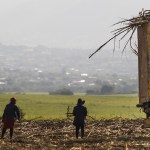BUSINESS REFLECTION
After the Bell: It’s the cen … sis [sic]
![After the Bell: It’s the cen … sis [sic]](https://www.dailymaverick.co.za/wp-content/uploads/2023/10/Untitled-1-29.jpeg?w=720)
Numbers, as we all know, are as open to interpretation as views or perspectives. With that in mind, may I just pass on some of my perspectives on the publication of the recent census?
The reason it worries me is because the presentation of the census seems heavily oriented towards demonstrating the government’s wonderful achievements. For example, Statistics SA highlighted the increase in access to electricity, which the census showed had increased from 58.1% in 1996 to 94.7% in 2022. Of course, having access to electricity is different from actually having electricity, as we all know.
Still, only the most churlish would claim no progress has been made in service delivery over the past 29 years, and one impressive achievement is that piped water inside houses has increased from 44% in 1996 to just under 60% in 2022. I’m always encouraged by the increase in school attendance rates of six-year-olds, which has gone from 49% in 1996 to 95% in 2022. Who isn’t encouraged by that number, although we were almost there in the 2011 census?
My reasons for discouragement arising from the census numbers lie elsewhere.
There is a saying that demographics is destiny, and if that is true, the overall increase in population is impressive. SA’s population is now larger than all but four European countries, and by the next census will be larger than all but one. Eventually, the sheer weight of our numbers will start reflecting in SA’s position in the world, and hopefully in business activity; this should be equally true of a bunch of other African nations.
Former president Thabo Mbeki was always keen to describe the 21st century as the “African century”. Economically, that seems far off, but demographically, by the latter half of this century, you just can’t see Africa being the overlooked continent any more.
Interestingly, the rate of SA’s population growth has increased over the past decade. In the previous three decades tracked by the census, SA’s population grew by 10% and 15%, respectively, between census one and three. This past decade it increased by 20%, boosted by a big increase in immigrants, now totalling about 2.4 million. In a population of 62 million, that is not a huge number, but the census has probably undercounted them, and it is triple the number of foreigners that resided in SA in 1996.
For urban planners, these increases constitute monumental challenges. Housing, water provision, electricity, roads and every aspect of city life will be challenged. And it worries me that there aren’t any visible plans in place to deal with these increases in this proportion.
That stress is going to be felt very acutely in two places: Johannesburg and Cape Town. There has been a lot in the press about Johannesburg-to-Cape Town “semigration”. But the census shows that Joburg is still attracting huge numbers of newcomers — many more than Cape Town, as it happens.
Cape Town is attracting people from the Eastern Cape and Gauteng. Gauteng might be losing some people to the Western Cape but it’s attracting more from almost everywhere else. Gauteng has gone from a population of 8 million in 1996 to 15 million last year. The Western Cape has seen a slightly larger proportional increase but a lower increase in absolute numbers, going from a population of 4 million to 7.4 million.
Still, if this were a race, which actually it is, you would have to say Cape Town is hands down the winner. Cape Town now has the same size population as Johannesburg, presumably partly a function of Gauteng’s many high-density population points. But the Western Cape has gone from being the fifth-largest to the third-largest province. Shows you what consistently good administration does.
And on the subject of administration, there is one other worrying thing — well, it’s worrying to me; some people will welcome it, I suppose — and that is white emigration. SA’s white population has dropped from 11% of the population in 1996 to 7.3% in 2023.
It’s the demographic effect of lower birth rates, you might argue. And the total number of white South Africans has been pretty static at around 4.5 million. ’Fraid not. Just one comparison is that the number of Indian South Africans increased by 60% in absolute numbers between 1996 and last year. Even with a lower birth rate than the average, the increase in white South Africans should be around that numerical increase, perhaps slightly less. In fact, the white population has remained static, which implies that at least 1.5 million white South Africans have left the country.
I’m really not sure what to make of that, but to lose a chunk that size of your middle class is a bit of a problem, in my view. DM


















Our increase in population is great for the big corporates. Lots of workers drives down wages and lots of customers boosts profits. Not so good for the unemployed desperately competing for jobs or scrabbling to access meagre government services. And this does not even begin to consider the impact of our exploding population on biodiversity, water needs, carbon emissions etc etc. We should urgently increase the child grant for the first two children and then no more child grants after that.